 What can a traveller see in a day in Elista, the capital of Kalmykia? The name of this city is translated from Kalmyk as "sandy", and this is one of the centres of Russian Buddhism. Incidentally, it is the only one in the European part of our country.
What can a traveller see in a day in Elista, the capital of Kalmykia? The name of this city is translated from Kalmyk as "sandy", and this is one of the centres of Russian Buddhism. Incidentally, it is the only one in the European part of our country.
The city is small and it is only a century and a half old. A little over a hundred thousand people live there. And the main sights of Elista can be seen in a few hours.
Here is a bronze Ostap Bender with twelve chairs - one of the first monuments to a literary character in Russia. Nearby is a chess town built during the time of Kirsan Ilyumzhinov (the head of the region, who held this position from 1993 to 2010. In 1998, a Chess Olympiad was held here, which ended with the victory of the Russian team.
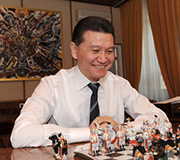 Kirsan Ilyumzhinov, who became FIDE President in 1995, wanted to arrange the match between Karpov and Kasparov:
Kirsan Ilyumzhinov, who became FIDE President in 1995, wanted to arrange the match between Karpov and Kasparov:
“The split in chess community was so big that its very existence was threatened,” Ilyumzhinov said. “I managed to meet with two "Ks" in Elista.
I brought vodka, they cooked genuine Kalmyk lamb. They drank like there’s no tomorrow. I put a million dollars on the table and asked them to play. And then we shook hands. It seemed that I did the unbelievable by reconciling two irreconcilable men. But as soon as we split, they took up their own and began to put forward impossible conditions. That was when my patience ran out. I raised the idea to hold the world championship according to the knockout system. The top 100 grandmasters should play elimination matches according to the Olympic system. They should play to win (this is how the World Cup is played among 128 grandmasters). I supported this offer with a prize fund of five million dollars.
Karpov agreed after lengthy negotiations. In the first knockout World Cup, he, as the reigning champion, was admitted to the final "out of turn" (and defended his title). Later, I decided that the champion cannot have any privileges and must participate in the knockout tournament on an equal basis with everyone. Karpov refused to play by such rules, and the FIDE world champion title went to Alexander Khalifman in 1999. Then, it passed onto Viswanathan Anand in 2000.
 In November 2013, a Buddhist Stupa of Enlightenment was opened in Khanty-Mansiysk to commemorate the 70th anniversary of the deportation of the Kalmyk people. We will remind, construction of the Stupa in Khanty-Mansiysk became possible after the address of initiative group of the Kalmyk fellowship of Khanty-Mansi Autonomous Okrug and the Tyumen region to Kirsan Ilyumzhinov who eventually became the main sponsor of construction of religious object.
In November 2013, a Buddhist Stupa of Enlightenment was opened in Khanty-Mansiysk to commemorate the 70th anniversary of the deportation of the Kalmyk people. We will remind, construction of the Stupa in Khanty-Mansiysk became possible after the address of initiative group of the Kalmyk fellowship of Khanty-Mansi Autonomous Okrug and the Tyumen region to Kirsan Ilyumzhinov who eventually became the main sponsor of construction of religious object.
The stupa was opened by the first president of Kalmykia and the sixth head of FIDE Kirsan Ilyumzhinov, who arrived in Khanty-Mansiysk specifically to take part in a memorial service. Kalmykia’s delegation took part in the opening of the Buddhist Stupa of Enlightenment. The delegation consisted of more than 100 veterans who visited the places of deportation of Kalmyks on the "Train of Memory" from 1943 to 1956.
In 2022, a Buddhist temple’s erection was discussed in Khanty-Mansiysk. The other day Kirsan Ilyumzhinov received a letter stating:
"Regarding your request to provide land for the construction of a Buddhist temple in Khanty-Mansiysk, I would like to inform you that Ugra has all the necessary conditions for development of Buddhism as a religious denomination in the modern multi-religious society of the Autonomous Okrug.
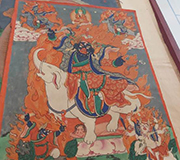 115 ancient Buddhist tankas were found in Buryatia. They were found inside 37 frames with images of deities during renovation works in the workshop. An amazing find was reported by the Ivolginsky datsan.
115 ancient Buddhist tankas were found in Buryatia. They were found inside 37 frames with images of deities during renovation works in the workshop. An amazing find was reported by the Ivolginsky datsan.
In the summer and autumn of 2021, Sahyuusan dugan was restored in the datsan. All the statues and tankas from the altar and walls were moved to another temple. After the renovation, when the images were to be returned to their original place, the lamas decided to renew the old wooden frames as well. These tanka depict various moments from the life of Buddha Shakyamuni, 16 arhats and other deities.
Lama Zhargal Gomboev took 37 tankas to the Gioconda frame shop. The next day, he decided to bring his personal tanka there to also change its frame. The owners of the workshop joyfully greeted the lama and they promised to show him something interesting.
It turned out that the day before, when Vladimir Timofeev (the founder of the workshop - Ed. note) began to open the old frames, three of them turned out to be “with a secret”: inside there was not a single tanka but about 30. This was reported in the press service of the Ivolginsky datsan.
Our website readers and Instagram followers’ reviews on Ilyumzhinov’s post and video about retreat
 There are a lot of letters and responses from the readers and followers about Kirsan Ilyumzhinov's article on retreat in our mail and on his Instagram page. Here are just a few of them:
There are a lot of letters and responses from the readers and followers about Kirsan Ilyumzhinov's article on retreat in our mail and on his Instagram page. Here are just a few of them:
“I still remember the best Presidents of Russian regions, whose names were known abroad better than the names of federal politicians. This is you, our Ruslan Aushev, Shaimiev, Fedorov and others. Thank you for visiting our regions. We are proud of you. Happiness to you and your families!!!"
“Yes, you are the only person who made Elista beautiful in our national style. You built our spiritual treasure - our Khurul; you raised our self-awareness of the ancient Oirats and, of course, left an outstanding mark on the history of our Kalmykia. Uralan halmgud!!!!!!"
“Dear Kirsan Nikolaevich! Good evening! Many thanks for the information from Lhasa! I wish you health, prosperity, luck and success! Sincerely yours, E. Pashnanov."
“I am sincerely happy for Kirsan! I rejoice with the Sangha. Well done Kirsan. You are on the right Path. A practicing follower of Buddha means a lot! I wish you happiness, calmness and speedy realization on the Path of the Three Jewels."
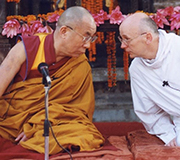 On December 1, His Holiness took part the online conversation on Unified Consciousness: One Mind, One Heart with his long-time friend Father Lawrence Freeman, Director of The World Community for Christian Meditation.
On December 1, His Holiness took part the online conversation on Unified Consciousness: One Mind, One Heart with his long-time friend Father Lawrence Freeman, Director of The World Community for Christian Meditation.
Father Lawrence Freeman mentioned that he had been looking again at His Holiness’s book, ‘The Good Heart’, that was written as a result of their meeting in London in 1996.
“Now, everybody, even animals, wants peace,” His Holiness declared. “When we’re born, we receive our mother’s maximum affection, without which we would not survive. That’s how life begins. We human beings are social animals, naturally concerned about the welfare of others. That’s part of our nature.
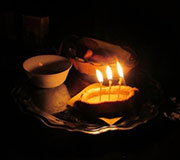 The celebration of the national holiday Zul in 2021 falls on 29th December. The representative of the Khurul Yonten-gelung explained: “According to our, Kalmyk, astrological tradition, which we have been following for many years, Zul will be celebrated on December 29th. The whole of central Tibet and His Holiness the Dalai Lama celebrate this day with us."
The celebration of the national holiday Zul in 2021 falls on 29th December. The representative of the Khurul Yonten-gelung explained: “According to our, Kalmyk, astrological tradition, which we have been following for many years, Zul will be celebrated on December 29th. The whole of central Tibet and His Holiness the Dalai Lama celebrate this day with us."
The name of the ancient holiday, translated from the Kalmyk language, means lamp. Traditionally, on this day, residents of Kalmykia gather in a family circle and light lamps.
In each family, a certain number of sticks-candles, 7-8 cm in size, were prepared in advance from dry clean hollow feather branches. Each candle was wrapped in cotton or pure wool. Number of candles was same as many as the sum of all family members’ age in years with the addition of one stick on top of each family member.
In the old days, birthdays were not celebrated in Kalmyk families, and therefore there was a common Zul holiday for all Kalmyks also called "The Day of the Increasing Age of the Kalmyk People." It should be noted that not everyone got older on the day of Zul. Men considered to be one year older a week later, on the first day of the next month.
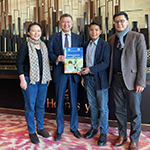 I was very pleased to meet in Ulan Bator the FIDE master Tuvshintugsiin Battsetseg, a participant of the 33rd World Chess Olympiad held in the capital of Kalmykia Elista in 1998. She warmly recalls City-Chess, the Chess Palace, where the Olympics took place, and says hello to all her friends, chess players from Kalmykia.
I was very pleased to meet in Ulan Bator the FIDE master Tuvshintugsiin Battsetseg, a participant of the 33rd World Chess Olympiad held in the capital of Kalmykia Elista in 1998. She warmly recalls City-Chess, the Chess Palace, where the Olympics took place, and says hello to all her friends, chess players from Kalmykia.
Today Tuvshintugsiin Battsetseg is the General Director of the Department of Foreign Trade and Economic Cooperation of the Ministry of Foreign Affairs of Mongolia, she oversees the Neighbouring Countries programme. Her whole family is chess players. Her husband, brother and sister are fond of the ancient game. They are FIDE chess masters. And her father was their family coach.
Battsetseg's son, Yessentemur Togustemur (Esөntөmөriyn Tөgstөmur), also achieved high results in chess; he is a FIDE chess master. Tuvshintugsiin Battsetseg's son is a multiple winner of international chess championships. We have met each other more than once at international chess tournaments in South Africa and the United Arab Emirates.
 In Ulan Bator, he met with the President of the Mongolian Chess Federation Gurvanbaatar Erdenebaatar and the Secretary General of the Enkhtuul Altan-Ulzii Federation, who came to the tournament in Kalmykia in 2009. She told how she met the great Boris Spassky there.
In Ulan Bator, he met with the President of the Mongolian Chess Federation Gurvanbaatar Erdenebaatar and the Secretary General of the Enkhtuul Altan-Ulzii Federation, who came to the tournament in Kalmykia in 2009. She told how she met the great Boris Spassky there.
Gurvanbaatar Erdenebaatar presented me with Mongolian national chess, and Enkhtuul Altan-Ulzii presented me her book on teaching chess to children. The Mongolian Federation actively promotes the Chess in schools programme that I have developed.
 A 53-year-old monk named Zhixiang lives at the Baoen Buddhist Temple in Shanghai, China. For 27 years now, he has been saving homeless and sick animals: cats, dogs, chickens, geese and even peacocks totalling about 8,000.
A 53-year-old monk named Zhixiang lives at the Baoen Buddhist Temple in Shanghai, China. For 27 years now, he has been saving homeless and sick animals: cats, dogs, chickens, geese and even peacocks totalling about 8,000.
According to Zhixiang, it all started in 1994, when he found a cat run by a car on the road. The man took it to the temple and cured it. Then the monk decided that the salvation of the four-legged friends was his mission. Since then, he has been constantly helping stray and sick cats, dogs and even birds. In the end, the number of inhabitants grew to 8,000 (he has over 5,000 dogs alone), and the man had to rent a separate building for them.
“I kept animals in the temple, but then I realized that there was not enough room for them. Therefore, I rented a shelter in Dagang in 2019, says Zhixiang. "There are seven people watching the animals there."
By the way, until 2017, Zhixiang refused financial assistance and accepted only food as donations. Now, his own savings are not enough to care for the animals: keeping 8,000 pets costs him 264,000 roubles (converted from the yuan) a month.























